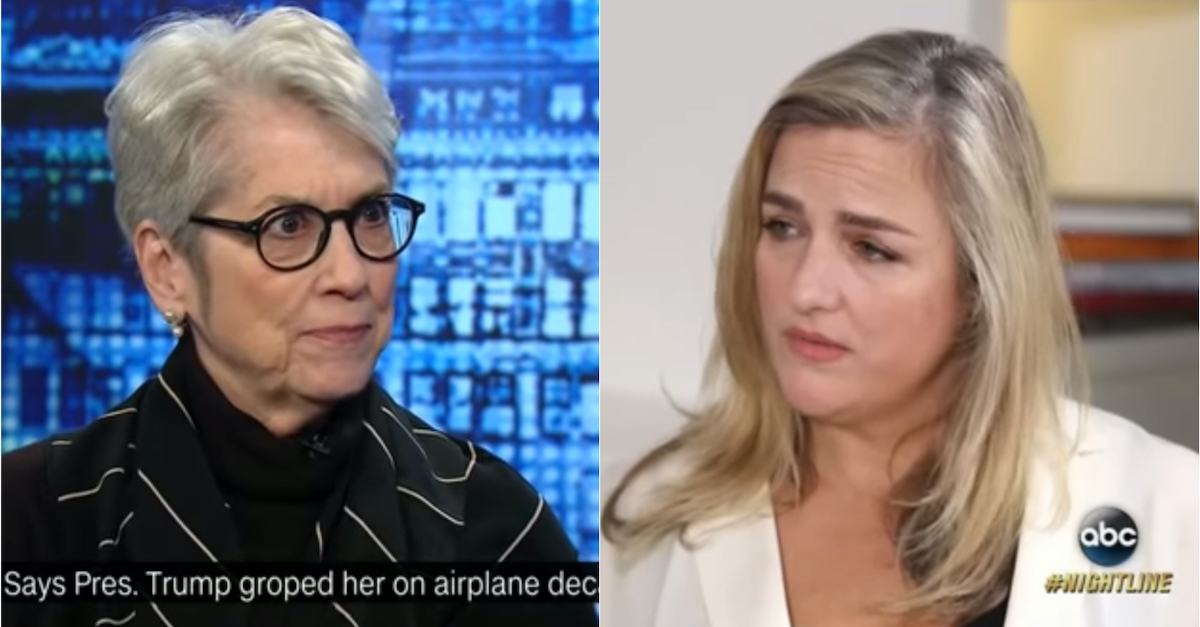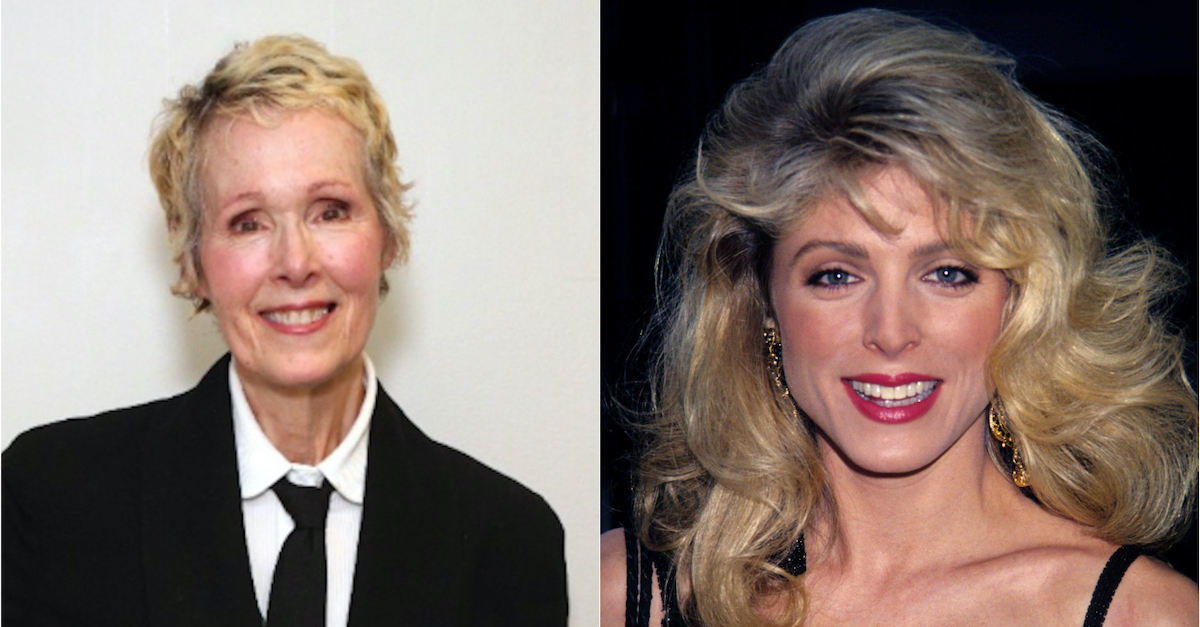
Jessica Leeds was interviewed by CNN and Natasha Stoynoff was interviewed by People Magazine via ABC’s Nightline (Screenshots via YouTube)
In the same ruling allowing a jury to see the infamous “Access Hollywood” tape, a federal judge gave the green light for two other women accusing former President Donald Trump of sexual misconduct to testify against him in E. Jean Carroll’s lawsuit.
For Senior U.S. District Judge Lewis Kaplan, the accusations leveled by businesswoman Jessica Leeds and People magazine writer Natasha Stoynoff were too similar to Carroll’s to discount.
“Mr. Trump’s attempt to minimize the similarity between his alleged actions with respect to Ms. Leeds and Ms. Stoynoff, on the one hand, and Ms. Carroll on the other is not very persuasive,” the judge wrote in a 23-page opinion on Friday. “The alleged acts are far more similar than different in the important aspects. In each case, the alleged victim claims that Mr. Trump suddenly attacked her sexually. In the cases of Ms. Carroll and Ms. Stoynoff, he allegedly did so in a location after closing a door behind him, which gave him privacy. In all three cases, he allegedly did so without consent.”
Carroll alleges that Trump raped her in the dressing room of a Bergdorf Goodman store in the mid-1990s. She and the former president are preparing for trial in April, which the presiding judge said would amount to a “he said, she said” case.
“There will be no physical evidence supporting either side at trial,” Kaplan noted, adding that the credibility of Trump’s accusers will weigh heavily upon the trial.
At least 26 women have accused Trump of some form of sexual misconduct.
With a high-profile federal court showdown shining a light on three of those cases, Law&Crime breaks down Leeds’ and Stoynoff’s allegations — and how they may affect the Carroll v. Trump trial.
1. The women’s allegations against Trump span more than a quarter of a century.
The “Access Hollywood” tape nearly derailed Trump’s career when he boasted to Billy Bush about grabbing women “by the p—-.” Both women claim that Trump practiced what he preached in the video, in alleged incidents decades apart.

Donald Trump and Billy Bush exit the bus in the ‘Access Hollywood’ tape. (Screenshot via NBC)
Leeds claims she had been seated next to Trump in a first-class seat on a flight from Texas to New York in 1979. After they finished an in-flight meal, Leeds says, Trump started “grabbing me, trying to kiss me, grabbing my breasts, pulling me towards him, pulling himself on me.”
“It was when he started putting his hand up my skirt that I realized that nobody was going to save me but me, and I was on the aisle, I managed to wheel my way out of the chair, and grabbed my purse, and I went back to my seat in the back,” Leeds testified in a deposition.
At a fundraising gala for the Humane Society of New York at Saks Fifth Avenue sometime later, Leeds said, she had been handing out seat assignments when Trump and his wife approached.
“I remember you. You’re that c— from the airplane,” Trump taunted, according to her testimony.
In 2005, Stoynoff says that she went to Mar-a-Lago to interview the then-real estate mogul and his wife Melania Trump for People magazine. She claims that the trouble started after the then-future president offered to show her a painting hanging in one of the rooms and then shut the door.
“I turn around and he’s right here, and he grabs my shoulders and pushes me against this wall and starts kissing me,” Stoynoff testified.
Stoynoff said that she was in “complete shock” and pushed back at Trump, twice. She says she unpinned herself after a butler walked into the room.
Together with Carroll’s account — dated sometime in the mid-1990s — the women’s allegations span just more than a quarter of a century.
2. All three women say that Trump’s alleged actions amount to state or federal crimes.
Carroll’s lawsuit against Trump under New York’s Adult Survivors Act went out of the way to accuse the former president of having committed six crimes, including rape in the first degree.
All of the statutes cited in Carroll’s lawsuit relate to New York’s penal code. The other five statutes are rape in the third degree (§ 130.25), sexual abuse in the first degree (§ 130.65), sexual abuse in the third degree (§ 130.55), sexual misconduct (§ 130.20), and forcible touching (§ 130.52).

E. Jean Carroll (Photo courtesy of Ms. Carroll)
If Leeds’ story is true, the mile-high crime that Trump committed was federal.
Judge Kaplan writes in a remarkable footnote: “49 U.S.C. §§ 46506 and 46501 (2) make it a crime to commit an act on an ‘aircraft in the United States’ that would violate any provision of chapter 109A of title 18 of the United States Code if the act had been committed in the special maritime and territorial jurisdiction of the United States.”
From here, the judge notes that Leeds’ allegations fit under the federal definition of unwanted “sexual contact,” which would have been illegal in a special maritime and territorial jurisdiction under 18 U.S.C. § 2244 (a)(1).
As for Stoynoff’s claims, Kaplan found that those would have violated Florida law, including one punishing “sexual battery.”
The judge emphasized that these findings are why Leeds and Stoynoff can testify.
“In order to be admissible under Rule 415, evidence of a sexual assault of a person other than the plaintiff must also have been a federal or state crime,” the judge wrote. “That requirement is satisfied here.”
3. All three women shared their accounts with reporters after the “Access Hollywood” tape went public.
In addition to the similarities in their stories, Carroll and Leeds are linked by an interviewer: CNN’s Anderson Cooper, who spoke to both women.
Leeds told Cooper that she decided to go public after hearing Trump’s denials at the second debate.
“I didn’t sleep that night, so the next morning I shot off a letter to the editor to the Times, just to get it off my chest,” Leeds said on the show. “And I thought that would be as far as it went. I really did. I thought I would be lucky to get a letter published.”
Instead, the New York Times ran a profile of Leeds and another woman Rachel Crooks, who was a 22-year-old receptionist for Bayrock Group when she says Trump kissed her without her consent in 2005. Multiple broadcast interviews with Leeds followed.
Carroll also went onto Cooper’s show, where the advice columnist alleged that Trump pulled down his pants and penetrated her. Trump has tried to use that Cooper interview against Carroll, misleadingly claiming that Carroll called rape “very sexy.”
In her interview, Carroll did tell Cooper: “I think most people think of rape as being sexy,” but she made that remark to contrast that public perception with what she said happened to her.
“This was not sexual,” Carroll told Cooper. “It just hurt.”
Stoynoff broke her silence with her employer: People.
“In those few minutes alone with Trump, my self-esteem crashed to zero,” Stoynoff wrote. “How could the actions of one man make me feel so utterly violated? I’d been interviewing A-list celebrities for over 20 years, but what he’d done was a first. Did he think I’d be flattered?”
PEN, the magazine’s broadcast division that’s short for the People/Entertainment Weekly Network, also conducted an on-camera interview with Stoynoff.
4. Trump insulted all of the women after they stepped forward with their allegations — in remarkably similar ways.
After Carroll went public with her rape allegations, Trump offered a curious denial to reporters: “She’s not my type.” The former president repeated that defense multiple times since then, even spelling out in a deposition that he meant that he didn’t find Carroll attractive.
The jibe was remarkably similar to Trump’s response to Leeds’ allegations.
“Believe me, she would not be my first choice,” Trump said at a campaign rally.
Carroll’s legal team says that insinuating his accusers are unattractive is part of Trump’s playbook and that in any event, there’s good reason to believe the former president is lying that Carroll isn’t his type.
In the same deposition, Trump apparently confused a photograph of Carroll with one of his ex-wives, Marla Maples.

E Jean Carroll and Marla Maples (Photo of Carroll via Images via Astrid Stawiarz/Getty Images for Glamour; Photo of Maples via AP via Adam Scull/PHOTOlink / MediaPunch /IPX)
Trump’s denial formed the basis of Carroll’s original defamation lawsuit.
In all three women’s cases, Trump either suggested or claimed that they are liars. He noted that Stoynoff ultimately ran her profile of him and Melania Trump without any mention of the alleged groping incident.
Why didn’t the writer of the twelve year old article in People Magazine mention the “incident” in her story. Because it did not happen!
— Donald J. Trump (@realDonaldTrump) October 13, 2016
In her reflections of the interview in People, Stoynoff said that she feared the professional consequences of stepping forward, just a year before the phrase “Me Too” was coined by activist Tarana Burke and more than a decade before it became a national movement.
“I was afraid that a famous, powerful, wealthy man could and would discredit and destroy me, especially if I got his coveted PEOPLE feature killed,” Stoynoff wrote.
The trial in Carroll v. Trump has been slated for April.
Have a tip we should know? [email protected]

